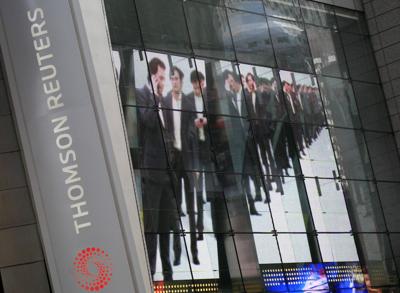In this time of widespread uncertainty in business, Thomson Reuters has a resilience others can only envy.
Corporate profit warnings have proliferated during the U.S.ŌĆÖs threatened trade war with much of the world.
And Thomson Reuters, an information, software and news provider based in Toronto, would seem to be additionally vulnerable to rapid advances in artificial intelligence (AI). Many companies still donŌĆÖt know what to make of AI: will it enhance their businesses or push them into irrelevance?
Yet Thomson Reuters is thriving under those conditions and has told shareholders to expect continued strong growth in coming years.
Thomson Reuters is rapidly building AI capabilities into many of its approximately 150 information management products for professionals in the legal, corporate, tax and accounting services.
Revenues at Thomson Reuters increased by seven per cent last year to $7.3 billion (U.S.), a good showing in a typically slow-growing industry. And Thomson Reuters expects revenues to increase by as much as 7.5 per cent this year and eight per cent in 2026.
Profit has almost doubled in the past five years, to $2.2 billion in 2024.
Thomson Reuters derives about 80 per cent of its business from long-term contracts, which helps insulate it from market turbulence.
And the return of Donald Trump to the White House could prove advantageous for Thomson Reuters.
The new administration has made a flurry of changes to the U.S.ŌĆÖs regulatory, tax and legal regime with many more changes to come.
That has increased demand for Thomson ReutersŌĆÖ specialized data management software that retrieves, organizes and updates information essential to Thomson ReutersŌĆÖs clients.
The U.S. government, already a major Thomson Reuters customer, might step up its own orders for AI-enabled information tools in its ambition to streamline government services.
Thomson Reuters also stands to benefit from widespread adoption of AI in the professions it serves. For instance, in legal services, one of the firmŌĆÖs biggest markets, the portion of lawyers using AI-enabled information tools almost doubled last year, to 26 per cent, according to surveys it has conducted.
Thomson Reuters spent more than $200 million last year upgrading its products. It expects to invest the same amount this year incorporating the latest AI advances into its existing products and developing new ones.
Thomson Reuters has the resources for those big investments. The firm has little debt and about $10 billion in capital available for product development and acquisitions.
CEO Stephen Hasker welcomes the scores of startups pioneering in advanced AI capabilities. That includes breakthroughs like ChinaŌĆÖs DeepSeek, a powerful yet relatively inexpensive set of AI tools that debuted in January.┬Ā
Such AI innovations reduce development costs for Thomson ReutersŌĆÖ own newest products and enable it to develop them faster.
The plethora of AI startups also presents Thomson Reuters with acquisition opportunities. Identifying acquisitions that are a good fit and smoothy integrating them has long been a Thomson Reuters strength.
Reuters News, which accounts for about 10 per cent of total revenues and dates from 1851, was acquired by Thomson Corp. in 2008. Thomson evolved from newspaper publishing into a provider of specialized information and tools for managing it.
Thomson Reuters is controlled by the Thomson family holding company Woodbridge Co. Ltd., which also owns the Globe and Mail.
Thomson Reuters had a head start in generative AI, the widely used AI application for creating new content including text and images based on existing data.
Thomson Reuters had been working with AI for several years by the time generative AI was taking off. It had just moved a great deal of its immense trove of data to the cloud. That has enabled Thomson Reuters to speed the development of new products.
Hasker says some clients are holding back on the expense of subscribing to the latest AI-powered information management products during the current slowdown in business investment caused by uncertainty around tariffs.
But there is an inevitability to AI adoption. Professionals recently surveyed by Thomson Reuters expect that AI will eliminate an average of 12 hours of work per week.
Thomson Reuters also hopes to benefit from ŌĆ£AI exhaustion.ŌĆØ Many of its clients are balking at the proliferation of AI products.
Rather than depleting their treasuries and overloading employees with too many AI tools, many large clients are waiting for multi-purpose AI products.
One of the earliest of those is Thomson ReutersŌĆÖ CoCounsel, a multi-tasking generative AI assistant. CoCounsel, launched in recent months, can perform multi-step processes, displacing AI products with limited functionality.
Thomson Reuters, whose stock has more than doubled in the past five years to a current $184, is a tech giant in disguise. It is overshadowed by the likes of Shopify.
And never mind that Shopify stock is pricier than that of Thomson Reuters, with price-earnings ratios of 87 and 38, respectively.




























To join the conversation set a first and last name in your user profile.
Sign in or register for free to join the Conversation